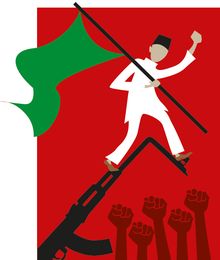There are two aphorisms about Pakistan’s army and its politics. One, that their politicians have been riding a tiger, the tiger being the army. Two, that the army has been losing all the wars, while winning all the elections.
Both aphorisms were proved wrong by events in the last two years that culminated in last month’s general election, the country’s 12th. For one, the army lost the election, though they managed the selection of the post-poll rulers. Two, the events showed that it is the army that is riding the tiger, the tiger being electoral politics.
It had looked like the politicians had been riding the tiger earlier, ever since prime minister Mohammad Ali Bogra invited General Ayub Khan to join his cabinet as defence minister in 1954. That proved to be like the merchant letting the fabled camel—or shall we say tiger?—into his tent. Since then Pakistan has had three coups, three constitutions, and 30 prime ministers, all of whom came to power on the pleasure of the generals and went out of power when the pleasure was withdrawn.
In between, the generals got into party politics, founding, funding, fashioning and sometimes finishing political parties. So much so, all the three leading parties of Pakistan owe their birth, growth or both to the army. General Yahya Khan nurtured Zulfikar Bhutto’s Pakistan People’s Party as a counter to Mujibur Rahman’s popular Awami League in East Pakistan; Zia-ul Haq nourished the Islamist Pakistan Muslim League to seek political legitimacy for his military regime; and the post-Musharraf generals funded and cheered the growth of Imran Khan’s Pakistan Tehreek-e-Insaf.
The PPP and PML have been coming to power on the army’s pleasure, and losing power when the army withdrew pleasure. So it should have been with the PTI. That’s where the army lost the plot.
The post-Musharraf generals, less Islamists than the namazi faujis of the Zia-ul Haq generation, had betted heavily on the handsome batsman who looked like a playboy, had had a Jewish English wife, looked harmless, and was called Im the Dim. They funded his party, got their ISI to do dirty work for him, and put him in the prime minister’s crease.
But soon the batter started hitting it all off-side, and the umpires in khakhi withdrew their pleasure. Out went the batter, but unlike the Sharifs and the Bhuttos before him, Khan made a loud appeal—not to any umpires clad in white or khaki, but to the ill-clad masses in the galleries. As the galleries exploded, the outgoing army chief Qamar Javed Bajwa declared that the army would slowly withdraw from politics; his successor Asim Munir seemed to nod his peak-capped head.
It was then that the army realised it had been riding the political tiger. Since last April we have been seeing things that were once impossible to imagine in Pakistan—mobs abusing the army, burning flag cars, ransacking flagstaff bungalows, looting command houses and more.
Look at what happened since. When the elections came, the generals got Imran arrested, his supporters booked, his party banned, his bat symbol frozen, his party’s meetings broken up, and finally the counting rigged. The masses still sought out his ‘batless’ candidates, and stamped the ballots on their myriad symbols in so large numbers that even the rigged results gave them more seats than the military-favoured Sharifs and Bhutto-Zardaris.
For the first time in Pakistan’s history, people’s will power prevailed over the army’s firepower. And the world came to know who was the tiger and who was the rider.
prasannan@theweek.in


